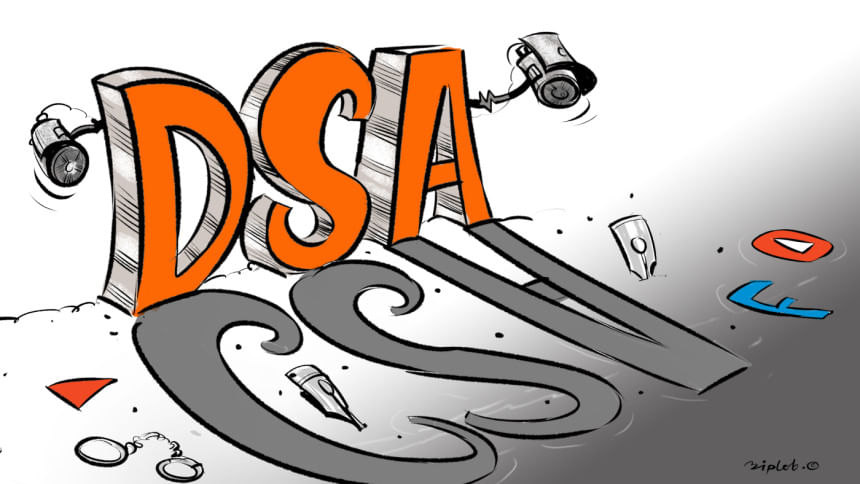The Digital Security Act (DSA) was widely used by politicians and government officials to settle personal disputes with journalists and to harass and intimidate them, according to a new study on the law.
The study also said journalists were treated like high-profile criminals, often arrested in the pre-trial stage at odd hours by large groups of police without being properly informed of the reasons for their arrest. Their families and lawyers were also kept in the dark.
Analysing 222 cases filed against 396 journalists, the research found that the DSA's vague and overly broad provisions criminalised acts such as defamation, alleged misinformation, and "offensive" speech and were used to punish reporting and criticism.
Most cases never reached trial, making the legal process itself the punishment. Of the cases that went to trial, most ended in acquittals, indicating that the allegations were largely baseless, it said.
"Only one journalist in the dataset was convicted," the study noted.
Conducted by the Clooney Foundation for Justice and the Centre for Governance Studies (CGS), the report said the DSA had a chilling effect on press freedom in Bangladesh.
Although the law has changed, many journalists are still dealing with its consequences, it added.
At least 73 cases were filed by politicians, with almost 70 percent of them affiliated with the then-ruling Awami League. Another 34 cases were filed by government employees.
In 63 cases, the complainants were not the direct victims or subjects of the speech in question. "Our data shows that proceedings under the DSA could be triggered by anyone, even if they were not directly harmed or mentioned by the speech," the study said.
The researchers conducted an in-depth analysis of 30 cases and interviewed the affected journalists. Of them, 27 were arrested in the pre-trial stage as non-bailable provisions were added to cases that involved bailable provisions.
Nearly half were arrested late at night or early in the morning, often by 30–40 officers in plainclothes. Only three were immediately informed of the reasons for their arrest or the charges against them.
Despite the repeal of the DSA by the Cyber Security Act (CSA) in 2023 and later by the Cyber Security Ordinance (CSO), the study warned that risks remain because pending DSA cases were not withdrawn.
It noted that the CSO includes a broad and vague provision that carries forward some of the flaws of Section 31 of the DSA. "It is not clear whether the new safeguards will be sufficient to prevent arbitrary arrests and prolonged proceedings even under a narrower law."
The study added that in October 2025, the CSO dismissed only certain types of pending DSA cases. "The interim government has not issued an exhaustive list of all cases dropped or withdrawn following the amendment, nor clarified the implications for people who have already suffered unjust prosecutions under the law."
The report recommended further reforms to protect journalists and press freedom in Bangladesh, so that no one is afraid to report the truth.
The findings were presented during a panel discussion on the last day of the Bay of Bengal Conversation -- a three-day international event that ended yesterday -- at a hotel in the capital.
At the discussion, Attorney General Md Asaduzzaman expressed hope that the upcoming parliament would refrain from introducing such restrictive laws in the future. "They should discuss with all stakeholders before enacting laws," he said.
He also urged journalists to propose solutions for protecting citizens who may be victims of irresponsible or misleading reporting. "We should find a balance between protecting journalists and protecting citizens," he added.
Maneka Khanna, senior legal program manager at the Clooney Foundation, presented the findings.
Barrister Sara Hossain, honorary executive director of BLAST, and Prof Sajjad Siddiqui, chairman of Dhaka University's Peace and Conflict Studies department, also spoke at the event.

